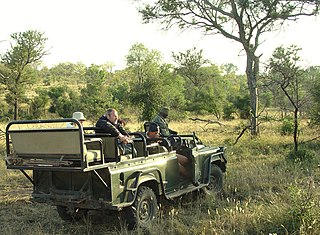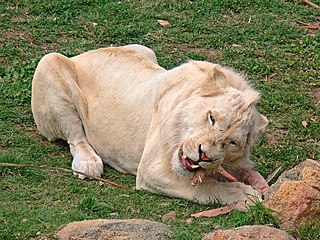
Hunting is the human practice of seeking, pursuing, capturing, and killing wildlife or feral animals. The most common reasons for humans to hunt are to obtain the animal's body for meat and useful animal products, for recreation/taxidermy, although it may also be done for resourceful reasons such as removing predators dangerous to humans or domestic animals, to eliminate pests and nuisance animals that damage crops/livestock/poultry or spread diseases, for trade/tourism, or for ecological conservation against overpopulation and invasive species.

Fox hunting is an activity involving the tracking, chase and, if caught, the killing of a fox, normally a red fox, by trained foxhounds or other scent hounds. A group of unarmed followers, led by a "master of foxhounds", follow the hounds on foot or on horseback.

In Africa, the Big five game animals are the lion, leopard, rhinoceros, elephant, and African buffalo. The term was coined by big-game hunters to refer to the five most difficult animals in Africa to hunt on foot, but is now more widely used by game viewing tourists and safari tour operators. They are examples of charismatic megafauna, featuring prominently in popular culture, and are among the most famous of Africa's large animals.

Louis Sebastian Theroux is a British-American documentarian, journalist, broadcaster, and author. He has received three British Academy Television Awards and a Royal Television Society Television Award.

Paul Edward Theroux is an American novelist and travel writer who has written numerous books, including the travelogue The Great Railway Bazaar (1975). Some of his works of fiction have been adapted as feature films. He was awarded the 1981 James Tait Black Memorial Prize for his novel The Mosquito Coast, which was adapted for the 1986 movie of the same name and the 2021 television series of the same name.

A safari is an overland journey to observe wild animals, especially in East Africa. The so-called "Big Five" game animals of Africa – lion, leopard, rhinoceros, elephant, and Cape buffalo – particularly form an important part of the safari market, both for wildlife viewing and big-game hunting.

Eugène Ney Terre'Blanche was an Afrikaner nationalist who founded and led the neo-Nazi Afrikaner Weerstandsbeweging. Prior to founding the AWB, he served as a South African Police officer, was a farmer, and was an unsuccessful Herstigte Nasionale Party candidate for local office in the Transvaal. He was a major figure in the right-wing backlash against the collapse of apartheid. His beliefs and philosophy have continued to be influential amongst white supremacists in South Africa and across the world.
A canned hunt is a trophy hunt which is not "fair chase", typically by having game animals kept in a confined area such as in a fenced ranch to prevent the animals' escape and make tracking easier for the hunter, in order to increase the likelihood of the hunter obtaining a kill. The term has been used for driven grouse shooting, in which large areas of Britain are farmed for red grouse. According to WordNet, a canned hunt is a "hunt for animals that have been raised on game ranches until they are mature enough to be killed for trophy collections."

Trophy hunting is a form of hunting for sport in which parts of the hunted wild animals are kept and displayed as trophies. The animal being targeted, known as the "game", is typically a mature male specimen from a popular species of collectable interests, usually of large sizes, holding impressive horns, antlers, furs, or manes. Most trophies consist of only select parts of the animal, which are prepared for display by a taxidermist. The parts most commonly kept vary by species but often include the head, hide, tusks, horns, or antlers.

Kilimanjaro Safaris is a safari attraction at Disney's Animal Kingdom on the Walt Disney World Resort property in Lake Buena Vista, Florida. It simulates an open-sided safari ride through the savanna of East Africa.

The white lion is a rare colour mutation of the lion, specifically the Southern African lion. White lions in the area of Timbavati are thought to have been indigenous to the Timbavati region of South Africa for centuries, although the earliest recorded sighting in this region was in 1938. White lions first became known to the English-speaking world in 1977 through the book The White Lions of Timbavati.

Safari Club International (SCI) is a US organization composed of hunters dedicated to protecting the “freedom to hunt.” SCI has more than 40,000 members and 180 local chapters. SCI members agree to abide by the organization's code of ethics, which includes making a positive contribution to wildlife and ecosystems, complying with game laws, and assisting game and fish officers.

Big Buck Hunter is a game hunting video game developed by Play Mechanix. Primarily developed for arcades, the goal of the game is to shoot moving bucks or male animals without shooting a doe or female animal.

The Most Hated Family in America is a 2007 BBC documentary film written and presented by Louis Theroux about the family at the core of the Westboro Baptist Church. The organization was led by Fred Phelps and located in Topeka, Kansas. Westboro Baptist Church members believe that the United States government is immoral due to its tolerance of homosexuality; in addition, they protest at funerals of U.S. military killed in action with signs that display text such as "God Hates Fags" and "Thank God for Dead Soldiers". With a BBC film crew, Theroux travelled to Kansas to spend time with members of the church and interview its leadership. Theroux interviews church leadership including Fred Phelps and Shirley Phelps-Roper.
In these first special programmes (2003), Louis Theroux returned to American themes, working at feature-length, this time with a more serious tone than in his earlier Weird Weekends work. For example, Louis and the Brothel takes a sympathetic look at the sex workers working at a legal brothel in Nevada whereas Under the Knife takes a more critical look at the world of plastic surgery. Other programmes cover a wide variety of topics including law and disorder and Nazis.

Law and Disorder in Johannesburg is a Louis Theroux documentary about the crime and private security situation in Johannesburg, South Africa. Theroux travels with heavily armed private security contractors who fill a security vacuum left by the government's inability to provide adequate security via normal means, such as policing. Theroux also meets with local people in Black townships, who practice vigilantism against suspected criminals.

A professional hunter is a person who hunts and/or manages game by profession. Some professional hunters work in the private sector or for government agencies and manage species that are considered overabundant, others are self-employed and make a living by selling hides and meat, while still others guide clients on big-game hunts.

Cecil was a male African lion who lived primarily in the Hwange National Park in Matabeleland North, Zimbabwe. He was being studied and tracked by a research team of the University of Oxford as part of a long-term study.

Green hunting is the practice of tracking and shooting game animals with non-lethal tranquilizer guns or bows and subsequently releasing the captured animals alive. Green hunting would typically be performed when tranquilization of the animal is necessary for veterinary, monitoring or species translocation purposes.

















